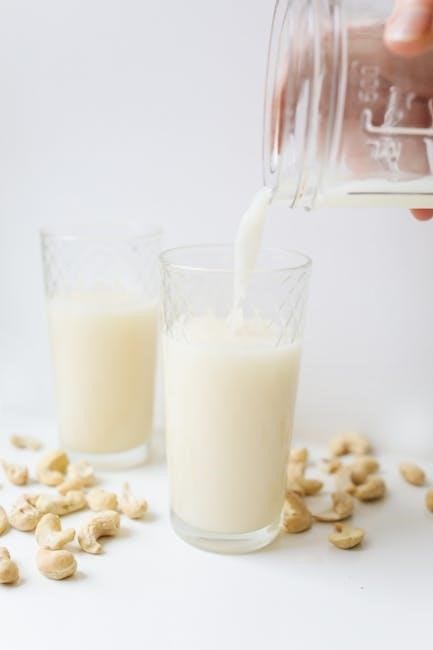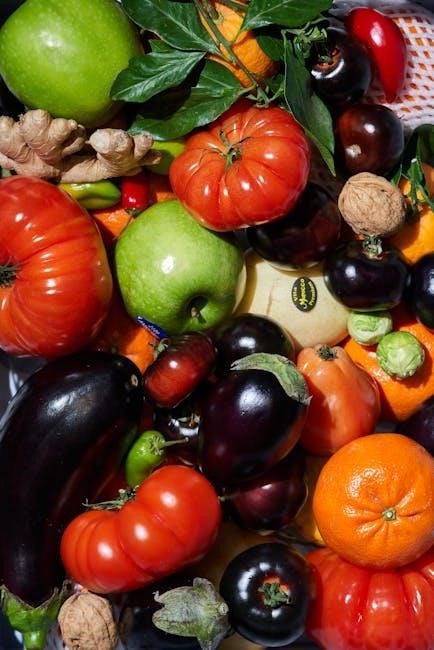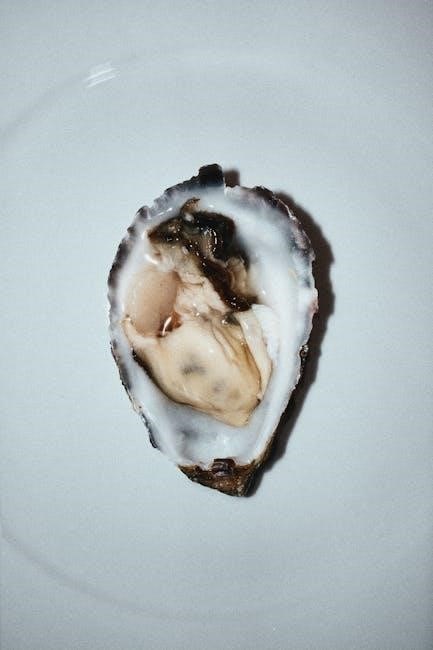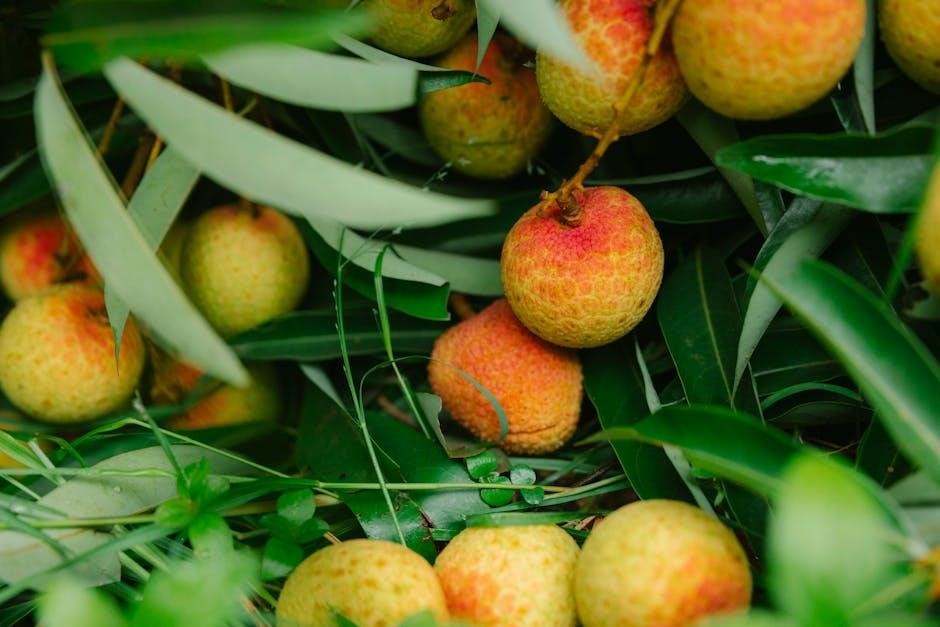A concussion‚ a mild traumatic brain injury‚ occurs when the brain is shaken inside the skull‚ causing symptoms like headaches and confusion. Proper nutrition plays a crucial role in supporting brain function and recovery‚ as the brain consumes 20% of daily calories and requires over 40 nutrients. A balanced diet rich in essential vitamins‚ minerals‚ and antioxidants can help alleviate symptoms and promote healing‚ making it a cornerstone of concussion recovery strategies.
1.1 Understanding Concussion and Its Impact on the Brain
A concussion‚ or mild traumatic brain injury‚ occurs when the brain is shaken inside the skull‚ often due to a blow to the head or body. It disrupts brain function‚ causing symptoms like headaches‚ dizziness‚ and confusion. The brain’s metabolic demands increase post-injury‚ making proper nutrition crucial for recovery and reducing oxidative stress‚ inflammation‚ and cognitive impairments.
1.2 The Role of Nutrition in Concussion Recovery
Nutrition plays a vital role in concussion recovery by replenishing depleted nutrients like vitamins C‚ D‚ E‚ magnesium‚ and zinc. Omega-3 fatty acids reduce inflammation‚ while antioxidants combat oxidative stress. A balanced‚ nutrient-dense diet supports brain function‚ accelerates healing‚ and minimizes symptoms. Proper hydration and avoiding harmful foods further enhance recovery‚ making nutrition a cornerstone of post-concussion care and cognitive restoration.

Essential Nutrients for Concussion Recovery
Essential nutrients like vitamins C‚ D‚ E‚ magnesium‚ zinc‚ and Omega-3 fatty acids play a critical role in reducing inflammation‚ restoring cellular health‚ and supporting cognitive function‚ aiding in symptom relief and recovery.
2.1 Vitamins and Minerals: Vitamin C‚ D‚ E‚ Magnesium‚ and Zinc
Vitamins C‚ D‚ and E are antioxidants that combat oxidative stress‚ while magnesium and zinc support brain function and repair. These nutrients can become depleted post-concussion‚ so incorporating foods like citrus fruits‚ leafy greens‚ nuts‚ and whole grains is vital for replenishment and recovery.
2.2 The Importance of Omega-3 Fatty Acids
Omega-3 fatty acids‚ particularly EPA and DHA‚ are essential for reducing inflammation in the brain‚ which can alleviate concussion symptoms like headaches and cognitive fog. Found in fatty fish‚ walnuts‚ chia seeds‚ and flaxseeds‚ these nutrients support brain cell communication and overall brain function‚ making them a critical component of a concussion recovery diet.

Anti-Inflammatory Foods
Incorporating anti-inflammatory foods into your diet aids in concussion recovery by reducing brain inflammation. Fatty fish‚ nuts‚ and seeds are packed with omega-3s and antioxidants‚ promoting healing.
3.1 Fatty Fish: Salmon‚ Cod‚ and Halibut
Fatty fish like salmon‚ cod‚ and halibut are rich in omega-3 fatty acids‚ particularly EPA and DHA‚ which reduce inflammation and support brain healing. Incorporating these fish into meals helps alleviate concussion symptoms like headaches and cognitive fog. Aim for 2-3 servings per week to maximize their anti-inflammatory benefits and promote recovery.
3.2 Nuts and Seeds: Walnuts‚ Chia Seeds‚ and Flaxseeds
Walnuts‚ chia seeds‚ and flaxseeds are packed with omega-3s and antioxidants‚ aiding brain recovery after a concussion. Walnuts support cognitive function‚ while chia and flaxseeds provide anti-inflammatory benefits. Incorporate a handful daily to reduce inflammation and improve brain health‚ enhancing recovery and reducing symptoms like cognitive fog and dizziness.

Antioxidant-Rich Foods

Antioxidant-rich foods like berries and leafy greens are essential for reducing oxidative stress and inflammation‚ promoting brain health and recovery post-concussion. They support cognitive function and healing.
4.1 Berries: Blueberries‚ Cranberries‚ and Strawberries
Berries are rich in antioxidants‚ particularly blueberries and cranberries‚ which combat oxidative damage and inflammation. They support brain health‚ enhancing cognitive recovery and reducing concussion symptoms. Incorporate them into meals or smoothies for a nutrient-packed boost that aids healing and improves brain function effectively.
4.2 Leafy Greens: Spinach‚ Kale‚ and Swiss Chard
Leafy greens like spinach‚ kale‚ and Swiss chard are rich in essential nutrients such as folate‚ vitamin K‚ zinc‚ and magnesium. These vitamins and minerals play a crucial role in supporting brain health and aiding concussion recovery by reducing inflammation and oxidative stress. Their high antioxidant content helps protect brain cells from further damage‚ promoting a faster and more effective recovery.

Foods to Avoid During Recovery
During concussion recovery‚ it’s important to avoid processed foods‚ sugary snacks‚ and foods high in saturated or trans fats. These can exacerbate inflammation and slow healing‚ hindering brain recovery. Opting for nutrient-dense‚ whole foods supports a healthier recovery process and reduces the risk of prolonged symptoms.
5.1 Processed Foods and Sugary Snacks
Processed foods and sugary snacks should be avoided during concussion recovery. These foods can cause inflammation‚ energy crashes‚ and worsen symptoms like headaches and fatigue. They lack essential nutrients and hinder the brain’s healing process. Opting for whole‚ nutrient-dense foods instead supports better recovery and reduces the risk of prolonged post-concussion symptoms.
5.2 Foods High in Saturated and Trans Fats
Foods high in saturated and trans fats‚ such as fried foods‚ baked goods‚ and processed meats‚ should be avoided during concussion recovery. These fats can increase inflammation and worsen symptoms like headaches and fatigue. They also contribute to blood pressure spikes‚ which may exacerbate brain discomfort. Prioritizing lean proteins‚ healthy fats‚ and whole foods helps support a smoother recovery process.

Hydration and Fluid Intake
Proper hydration is essential for brain health and recovery after a concussion. Water‚ herbal teas‚ and coconut water are excellent choices to maintain fluid balance and support healing.
6.1 The Importance of Water in Brain Function
Water is essential for brain health‚ comprising 80% of brain tissue. It supports cognitive function‚ focus‚ and memory. Dehydration can worsen concussion symptoms like headaches and fatigue. Drinking enough water helps maintain brain structure‚ regulates body temperature‚ and aids in toxin removal. Staying hydrated is crucial for optimal recovery and overall brain function after a concussion.
6.2 Herbal Teas and Coconut Water as Healthy Alternatives
Herbal teas like ginger and chamomile offer calming effects‚ aiding hydration and relaxation. Coconut water‚ rich in electrolytes‚ naturally replenishes fluids without added sugars. These alternatives complement water intake‚ supporting brain health and helping manage symptoms like nausea and fatigue‚ making them valuable for a balanced concussion recovery diet.

Meal Planning Tips
Plan meals that balance macronutrients‚ incorporating concussion-friendly foods like omega-3 rich fish‚ leafy greens‚ and berries. This ensures a steady supply of essential nutrients for brain recovery.
7.1 Balancing Macronutrients in Each Meal
Balancing macronutrients—carbohydrates‚ proteins‚ and fats—is essential for concussion recovery. Complex carbs provide energy‚ lean proteins support repair‚ and healthy fats‚ like omega-3s‚ reduce inflammation. Incorporate whole grains‚ nuts‚ seeds‚ and fatty fish to create nutrient-dense meals that promote brain health and recovery.
7.2 Incorporating Concussion-Friendly Foods into Daily Meals
Incorporate concussion-friendly foods like leafy greens‚ berries‚ and omega-3 rich fish into meals for optimal recovery. Add spinach or kale to smoothies‚ top oatmeal with blueberries‚ or include grilled salmon in dinners. These foods reduce inflammation‚ support brain function‚ and provide essential nutrients for healing. Aim for variety and consistency to ensure a balanced intake of recovery-promoting nutrients.

Supplements for Concussion Recovery
Supplements like omega-3s (EPA/DHA) and multivitamins can support brain healing by reducing inflammation and replenishing essential nutrients. Consult a healthcare provider before starting any supplementation regimen.
8.1 Omega-3 Supplements: EPA and DHA
Omega-3 fatty acids‚ particularly EPA and DHA‚ are crucial for reducing inflammation and supporting brain health. Found in fatty fish and supplements‚ they help alleviate concussion symptoms like headaches and cognitive fog. DHA supports brain membrane structure‚ while EPA reduces inflammation. Food sources include cod‚ salmon‚ and walnuts‚ but supplements may be necessary to meet therapeutic levels‚ especially if dietary intake is insufficient.
8.2 Multivitamins and Mineral Supplements
After a concussion‚ key nutrients like vitamins C‚ D‚ E‚ magnesium‚ and zinc may become depleted‚ hindering recovery. Multivitamins and mineral supplements can fill these gaps‚ ensuring adequate levels of essential nutrients. Vitamin D supports brain health‚ magnesium aids energy production‚ and zinc promotes neuronal function. While a balanced diet is ideal‚ supplements provide a reliable backup to meet nutritional needs during recovery.

Lifestyle Considerations
Rest and sleep are vital for brain recovery after a concussion. Avoiding strenuous activities and gradually returning to normal routines can prevent setbacks and support healing.
9.1 The Importance of Rest and Sleep
Rest and sleep are critical for brain recovery after a concussion. The brain heals during sleep‚ so prioritizing adequate rest is essential. Avoiding strenuous activities ensures the brain isn’t overworked‚ reducing the risk of prolonged symptoms. Poor sleep can worsen fatigue‚ headaches‚ and cognitive fog‚ hindering recovery. Establishing a consistent sleep schedule and a calming bedtime routine can enhance sleep quality and support healing.
9.2 Gradual Return to Physical Activity
A gradual return to physical activity is crucial after a concussion to prevent worsening symptoms. Patients should avoid strenuous exercises initially and consult a healthcare provider to create a personalized plan. Rushing back too soon can increase recovery time and risk of further injury. A structured approach ensures safe progression‚ reducing prolonged symptoms and promoting full recovery.
Nutrition is vital for concussion recovery‚ with omega-3s‚ antioxidants‚ and hydration aiding brain healing. Avoid processed foods and focus on balanced meals to support cognitive health and recovery.
10.1 Summary of Concussion Diet Principles
A concussion diet focuses on nutrient-rich foods to support brain recovery. Prioritize omega-3 fatty acids‚ antioxidants‚ and hydration while avoiding processed foods and saturated fats. Include lean proteins‚ whole grains‚ and anti-inflammatory foods like fatty fish‚ berries‚ and leafy greens. These principles aim to reduce inflammation‚ enhance cognitive function‚ and promote overall healing during the recovery process.
10.2 Final Tips for a Successful Recovery
Adopting a balanced diet rich in omega-3s‚ antioxidants‚ and hydration is key. Gradually reintroduce physical activity and ensure adequate rest to avoid overexertion. Avoid processed foods and sugary snacks that can hinder recovery. Consult a healthcare provider to tailor your nutrition plan and monitor progress. Consistency and patience are essential for optimal healing and returning to full cognitive and physical function.
